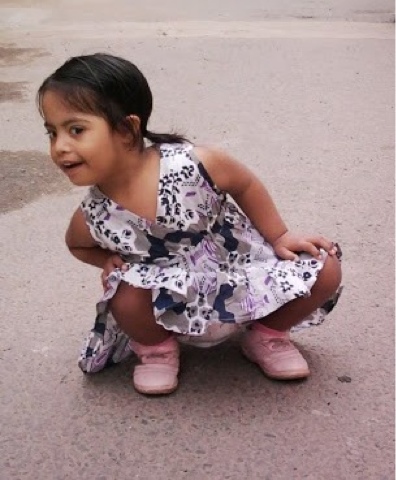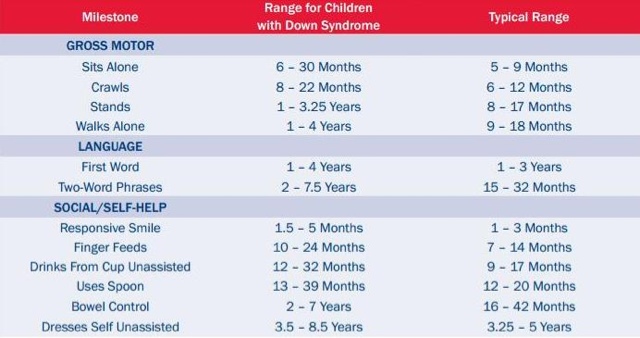‘Take it easy…its just an Extra Chromosome!!’
Isn’t it brilliant ? So simple yet so effective. So informative yet so heart warming. When it comes to Down Syndrome or other disabilities, we tend to make things harder than they actually are by dwelling on it too much. There is a sea of information available on the internet and while it is good to have all the knowledge we can get, sometimes too much information can also be overwhelming and that is what happened with me too.
The reason I put together this information guide for ‘New Parents of children with Down syndrome’ was to help answers to the concerns one might have. Sometimes a friendly pat on a shoulder is needed more than the doctor’s advisory manual. This little effort is to connect heart to heart and heart to mind!
Also before you start reading the common concerns with Down Syndrome, There is an open letter that I wrote sometimes back in a post for all new parents. It is straight from my heart and I am sure it would lift your spirits…here is the link
Hope you’d like it..
1. What is down syndrome ?
Down syndrome is a condition caused by an extra chromosome in the cells. It is a genetic condition. Chromosomes are very small fragments or particles that are present in every cell of our bodies. Typically, a baby recieves 23 chromosomes from each parent and have 46 chromosomes in all, but in Down syndrome, there are three copies of 21st chromosome, instead of usual two. There are no known reasons why this happens. It is nobody’ s fault and its just a natural accident.
2. How do I find for sure that my child has ‘Down Syndrome?’
Doctors can easily tell if a baby has Down Syndrome because of certain physical characteristics. Our babies generally have low muscle tones called hypotonia. Their head size is smaller than typical babies. Most of the time their face looks a little flattened and there is an excess skin on the back of their necks. They also have beautiful almond shaped eyes that slant upward. Many children have single crease in the palm of their hand however some typical babies might also have a crease like that. They also might have a larger gap between their big and second toe.
3. Can doctors be wrong about my child’s diagnosis?
More often than not it is easy for the doctors to find out about Down Syndrome but to be sure a blood test or karyotyping is done. This is called a chromosomal analysis test and will identify the extra chromosome. It can be done in all the major hospitals. The results can take time depending on where you get it done from. We had that test done in AIIMS ( All India Institute of medical sciences) and it took good 3 months for the result to come.
4. Can Down Syndrome be cured?
Down syndrome is a condition and not a disease so it can’t be cured but early intervention and support from family and friends can help individuals with Down Syndrome lead a fulfilling, semi independent life.
5. Can Down Syndrome be prevented?
No, there is no way to prevent Down Syndrome, however triple marker test in pregnancy can detect the extra chromosome. Interestingly a lot of mothers still go ahead with their pregnancy even after detection because the quality of life for our children have become much better than what it was few years ago. Children with Down Syndrome generally benefit from therapies that help them improve their physical and mental capabilities. For instance speech therapy, occupational therapy, and special education classes.

6. Are there different kinds of down syndrome ?
Yes, there are three types of Down syndrome: trisomy 21 (nondisjunction) accounts for 95% of cases, translocation accounts for about 4% and mosaicism accounts for about 1%.
7. What are the Medical problems Associated with Down Syndrome?
40% of children with down syndrome are born with congenital heart defects. A lot of them have respiratory, vision and hearing problems. There is also an increased risk of Alzheimer’s disease, childhood leukemia and thyroid conditions. You may find the information overwhelming but your baby might not necessarily have all, or possibly any of them. Even if she or he happens to have one or more of these conditions, then also because of medical advancements, most such complications are treatable.
8. How do I know if my child is profoundly or moderately affected by the extra chromosome?
All people with down syndrome experience intellectual delays. The effect, generally is between mild to moderate. You will know based on the milestone your child achieves and at what age, also you can get the child’s IQ or SQ done by psychologists and psychiatrist to have a fair idea of his condition. I would also like to add that such tests can not completely be indicative of the talents your child might have.
9. What are the physical features of a child with down syndrome?
A few common traits of Down Syndrome children are low muscle tone, small stature, an upward slanted almond shaped eye and an extra fold of the skin at the back of the neck. Most of the children with DS also have a single crease across their palms but a lot of people without down syndrome also have the same single crease. Every person with DS is unique and may possess above mentioned characterstics in various degrees or not at all.
10. When should I start early intevention of my child?
The first few years of life are crucial for a child’s development. All children go throguh the most rapid and significant changes during this period. While the parents are dealing with the shock, denial and hurt, the child needs the basic cognitive and physical skills to help achieve her milestones in time. Early intervention can start anytime after birth and is usually done till 3 years of age.
11. What are the milestones for children with Down Syndrome.
Children with Down Syndrome, while being delayed still differ greatly in their milestones. Depending on congenital heart defects, other medical conditions and introduction of early intervention the age at which they start walking, talking or doing other developmental activities can be different for different children. For reference purposes, the milestone chart is attached .. courtesy www.ndss.org
12. What is the average Life expectancy of children with Down Syndrome?
People with down syndrome are living longer and healthier lives than ever before. Life expectancy has risen sharply in recent decades from 25 in 80s to 60 and more today.
13. Can my Child go to a normal mainstream school?
Absolutely, your child can and should go to a mainstream school. With new RTE ( Right to Education Act ) no child can be denied an admission in any school. I know it will not be a cake walk but things are changing, schools are becoming sensitive and would most likely cooperate. Read my post on how I got my daughter admitted to all the mainstream schools I applied to.
14. What will my baby be like as an adult?
15. How has technology affected the lives of children with disabilities?
In the case of our children, technology is definitely proving to be a boon. Thanks to ever evolving software programs. Today, our children have better communication, understanding, basic maths abilities because of great applications that have helped them understand things in an effective way. Now interaction based applications make them an active participant which helps them in learning. They can operate laptops, ipads, play computer games and sometimes make a career in IT as well.
Some Resources that you might find useful…
Here are two sites that you may find helpful..
(The official website of India for children with down syndrome, look for the FREE guide book and hand book for parents, which is a great resource)
( wonderful resource)
And more than anything, we parents are there to help you, guide you and to hold your hand. You can reach out to me through my facebook page. It is a great reaponsibility that we’ve been given. Lets make the best out of it..
“When you focus on someone’s disability you’ll overlook their abilities, beauty and uniqueness. Once you learn to accept and love them for who they are, you subconsciously learn to love yourself unconditionally.”
― Yvonne Pierre, The Day My Soul Cried: A Memoir








[…] June 17, 2012 tmpadmin Leave a comment I know u think life has been unfair, and its completely alright to think that way. It seems that you were promised for something and was given something totally different. This was not meant to happen to me…what did i do to deserve this…all these questions and some more. The overwhelming emotions, the hurt, the anger and the pain, it will not go away overnight, but it will fade and will become bearable. It is absolutely OK to cry your heart out for the loss of the child that you always wanted, but trust me, time is the greatest healer. You might feel different now but eventually you’ll come to terms with this and then you’ll realize that its not as bad as u thought… Your child will do everything that a normal child would do but at his own pace. He might not become a rocket scientist but he can become a lot of things in given circumstances. The times are changing so is the attitude of people. For every person who’d look through your child, pretending he is invisible. There would be lots who’d stop and shake his hand.So its upto u to decide which way to look. I have learnt from my experience that the more I treat my daughter like a normal child, the more she is treated the same way by other people. The help that we can get these days in terms of therapies, new researches, books, technology can make a remarkable difference in our children’s lives. My daughter can operate a laptop and an ipad independentely and she has just turned 5. We could’ve not thought of it few years ago, so things are changing for good. The last thing I would like to say is “to have a life of your own”. Do something that makes you happy because a happy parent can make the family happy. The job that you’ve been given is going to be extremely demanding, frustrating and most of the times exhausting, But if you have a set of friends that you can talk to, a hobby or something that can get you some time for yourself, this journey would become easier and rewarding. So if you think you’ve cried enough and now want to move on. Welcome, we all are there to help you out. There are wonderful parents out there wanting to talk to you and help you. Gather yourself, look into your baby’s eyes, kiss her and be ready to take up the challenge…..all the best.For more information…here are some common questions, you’d like to read about.http://www.twominuteparenting.com/2013/07/09/the-baton-for-new-parents-of-children-with-down-syndrome/ […]